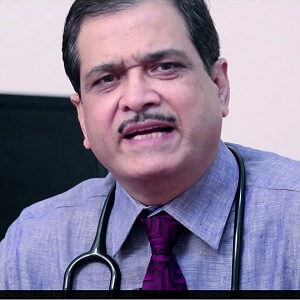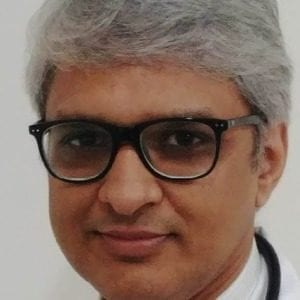Best Doctors in India for Cardiac Catheterization
- Top Interventional Cardiologist | Apollo Hospital, New Delhi, India
- 26+ Years Experience
- Indraprastha Apollo Hospital, New Delhi
Profile Highlights:
- Dr. Rajeev Kumar Rajput is one of the best Cardiologists in India with nearly 23 years of experience. He is a clinical cardiologist engaged in diagnosing and treating cardiovascular diseases.
- Dr. Rajput is currently working as a senior consultant with Indraprastha Apollo Hospitals, New Delhi, and also offers patient care at the Heart & Gynae Clinic.
- Dr. Rajeev Kumar Rajput specializes in Angiography and Interventional Cardiology. The treatments provided involve Neonatal and Infant cardiac surgeries, Device Closure, and Valve replacement. He has expertise in Aortic Aneurysm Surgery, Vascular Surgery, Percutaneous Coronary Interventions, Endovascular Repair, Cardiac Catheterisation, Open Heart Surgery, and MV replacement.
- Dr. Rajput is credited with publishing several papers in noted medical journals.
- Cardiologist, Gurugram, India
- Over 20 years’ experience
Profile Highlights:
- Dr. Vivek Chaturvedi is a highly experienced and acclaimed cardiologist with over 20 years of experience.
- He has performed more than 2500 cardiac ablations, several of them for complex arrhythmias like atrial tachycardia, ventricular tachycardia, VPC, and atrial fibrillation using the latest technology like 3D Electroanatomic mapping.
- He has more than 50 publications in international journals & books.
- Interventional Cardiologist, Chennai, India
- Over 15 years’ experience
- Apollo Hospitals Greams Road
Profile Highlights:
- Dr. Sai Satish is a distinguished Senior Interventional Cardiologist affiliated with Apollo Hospitals in India, renowned for his pioneering contributions to the field of transcatheter valve therapies.
- His expertise extends internationally, as he also serves as a practicing interventional cardiologist and esteemed faculty member at the Gottsegen Institute of Cardiology in Budapest, Hungary, one of the world’s leading centers for TAVR (transcatheter aortic valve replacement) training.
- A trailblazer in the realm of minimally invasive cardiovascular procedures, Dr. Satish is celebrated for performing the highest number of percutaneous edge-to-edge mitral repairs (MitraClip implants) in the Indian subcontinent.
Best Hospitals in India for Cardiac Catheterization
- City: New Delhi, India
Hospital Highlights:
- Over the last 33 years, the Fortis Escorts Heart Institute has set new standards in cardiac treatment with groundbreaking research. It is now known around the world as a centre of expertise for Cardiac Bypass Surgery, Interventional Cardiology, Non-invasive Cardiology, Paediatric Cardiology, and Paediatric Cardiac Surgery.
- The hospital has cutting-edge laboratories that perform a wide range of diagnostic tests in Nuclear Medicine, Radiology, Biochemistry, Haematology, Transfusion Medicine, and Microbiology.
- Fortis Escorts Heart Institute boasts a diverse group of bright and experienced doctors who are backed up by a team of highly qualified, experienced, and devoted support professionals as well as cutting-edge equipment such as the recently installed Dual CT Scan.
- Approximately 200 cardiac doctors and 1600 personnel currently collaborate to manage over 14,500 admissions and 7,200 emergency situations each year. The hospital now has a 310-bed infrastructure, as well as five cath labs and a slew of other world-class amenities.
- City: Faridabad
Hospital Highlights:
In the sprawling city of Faridabad, where healthcare needs are diverse and ever-evolving, one institution has consistently stood out as a beacon of excellence in the field of medicine—Marengo Asia Hospital. Established with a vision to provide world-class healthcare services to the community it serves, Marengo Asia Hospital has emerged as a trusted name synonymous with quality, compassion, and innovation in healthcare.
- City: New Delhi, India
Hospital Highlights:
- Equipped with 650 beds, BLK-Max Super Speciality Hospital is the largest stand-alone private sector hospital in Delhi.
- With over 1500 healthcare providers and 150 globally renowned super specialists, the hospital is one of Asia’s largest BMT Centres. The hospital is known for having some of the best cancer doctors in the country.
- The hospital is NABH and NABL accredited and was inaugurated by the first Prime Minister of India. Pt. Jawahar Lal Nehru.
- City: Chennai, India
Hospital Highlights:
- Located in Chennai, India, MGM Healthcare is a top multispecialty hospital that provides all medical services under one roof.
- Since its founding in 2019, MGM Healthcare has quickly become a leading national referral centre, creating several innovative flagship initiatives.
- MGM Healthcare combines next-generation medical and digital technologies to provide better patient results.
- With 12 centres of excellence, more than 400 inpatient beds, 100 intensive care unit beds, and 24/7 emergency care, MGM Healthcare leaves no chance in redefining the patient experience in Chennai.
- MGM Healthcare boasts 250+ expert doctors across 30+ departments, including Cardiology, Pulmonology, Neurology, Obstetrics & Gynaecology, and more.
- They house 12 specialized Centres of Excellence, including Neurosciences, Orthopaedics, and Multi-Organ Transplantation.
- Their team of doctors, nurses, and paramedics works together to give every patient individualized treatment.
- City: Noida, India
Hospital Highlights:
- Fortis Hospital, Noida, stands as one of the oldest and most trusted healthcare institutions in the region, setting a benchmark for comprehensive medical care.
- As the second mega hub hospital in the Fortis Healthcare Group, Fortis Hospital, Noida, upholds a legacy of trust among more than 1.2 million patients. By integrating top-tier professionals with cutting-edge technology, the hospital delivers superior treatment across various medical disciplines.
- Specializing in advanced Neurosciences, Orthopedics, Kidney and Liver Transplant Programmes, Fortis Hospital, Noida has successfully performed over 1,500 transplants, solidifying its reputation as a leader in specialized medical interventions.
Cardiac Catheterization
Cardiac Catheterization is a medical procedure that allows the doctor to evaluate heart conditions and diagnose & treat cardiovascular conditions. Other names for the procedure are coronary angiogram, cardiac cath, or heart cath.
The doctor will check the functioning of the blood vessels and how well they are supplying blood to the heart. He or she will inject a contrast dye into the blood vessels with the help of a catheter. This will help to create x-ray videos of the heart chambers, valves, and coronary arteries.
Why choose Cardiac Catheterization?
Depending on your conditions, your doctor will recommend the procedure to you to:
- Check the working of your heart muscles.
- Measuring pressure within your heart.
- Check the presence of heart diseases like heart valve disease, coronary artery disease, or disease of the aorta.
- Find the blocked or narrow blood vessels causing chest pain.
- Check the heart’s pumping function.
- Decide on your further treatment like bypass surgery or interventional procedure.
- Check the presence of congenital heart defects.
- Evaluate the problems with the valves of your heart.
- Measuring the oxygen amount in your heart.
Uses of Cardiac Catheterization
The nurse will guide the catheter with the help of a hollow plastic cover called a sheath. If it is in place, your doctor will start the tests required for the diagnosis of your condition. The procedure is useful for your doctor to find and evaluate the problems. Your doctor might perform some procedures during cardiac catheterization including:
- Coronary angiogram that includes injecting a dye with the help of a catheter. Your doctor will watch the path of the dye by an x-ray machine as the dye travels to check the narrowing of arteries or their blockages.
- Repair of the defects of the heart like closing a hole or stopping leaks from a valve.
- Ablation, for correcting heart arrhythmia or irregular heartbeat.
- Thrombectomy, done with the help of a catheter to remove blood clots that may dislodge & travel to other tissues or organs.
- Angioplasty, that involves the insertion of a catheter with a balloon at the tip into the artery. The balloon widens your artery upon inflation.
- Stent placement within your artery to keep the artery open. Stent placement involves placing a metal coil in the narrowed or blocked artery for preventing problems in the future.
- Balloon valvuloplasty, involving inflation of a balloon-tipped catheter into the blocked heart valves for opening the blockages.
- Biopsy for which the doctor will take a sample tissue from your heart.
Benefits of Cardiac Catheterization
Preparing for the procedure
Your doctor might instruct you if you need to prevent eating or drinking before Cardiac Catheterization. Usually, the doctors ask the patients to avoid drinking or eating from the night before the procedure. This is because liquids or foods may cause complications for the procedure. However, you may need to reschedule the procedure if you weren’t able to fast from midnight before the procedure. Your doctor might also instruct you to avoid taking certain medications.
You need to change into a hospital gown before Cardiac Catheterization. Your nurse will then put up an intravenous line or IV line to give you fluids & medication before, during, and after Cardiac Catheterization. Your nurse will also inject an anesthetic to numb the area before insertion of the catheter. Although you will be sedated during the procedure, you will be able to respond to the instructions of your nurse or doctor. Your nurse may ask you to take a deep breath, cough, or place your arm at various positions to get the best images of your arteries.
What to expect?
Before the procedure
Your nurse will check your pulse and your BP first. Your doctor will also you to remove your dentures or any jewelry that you might be wearing so that they don’t interfere with the images of the heart. He or she will ask you to wait in the pre-operative room before they could start the procedure.
During the procedure
Your doctor will perform the procedure in the operating room with special imaging & x-ray machines. The room will be a sterilized area to avoid any chances of infection. Your doctor will perform the procedure under sedation but you will be awake. However, he or she may administer general anesthesia for other procedures done with Cardiac Catheterization. The nurse will insert an IV line into your arm or hand for giving additional medications needed during the procedure. Your doctor will place electrodes or monitors on your chest to check the heartbeats during the procedure.
The nurse will shave the hair from the area of insertion of the catheter before the procedure. Before inserting the catheter into your artery, your doctor will administer an anesthetic to numb the site. Before there is numbness, you might feel a quick pain. After you start feeling numb, he or she will insert the catheter. Your doctor will make a cut or incision to access the artery. He or she will insert the plastic sheath within the cut to allow easy insertion of the catheter.
Now, according to your condition and the reason for Cardiac Catheterization in your case, the doctor will perform other procedures like biopsy or right heart catheterization or any other procedure. If you are awake during the procedure, your doctor may give you some instructions or tilt your table at times with the safety strap on.
After the procedure
Your doctor will ask you to rest in the recovery room for several hours after the procedure till the effects of anesthesia disappear. He or she will immediately remove the plastic sheath inserted in your body after the procedure. Your nurse will apply pressure on the insertion site after removing the catheter. You will go to a regular hospital after leaving the recovery room. You can eat or drink after the completion of the procedure. Your condition will help to decide if you can go home or need to stay back in the hospital for a day or two. If you have an additional procedure, your doctor might ask you to stay overnight in the hospital.
Results
Risks
Similar to other procedures, Cardiac Catheterization too, has some risks associated with it. However, major complications will rarely happen. The risks associated with this procedure may be:
- Bleeding
- Damage to the artery or heart
- Kidney damage
- Bruising
- Stroke
- Allergic reaction due to medications or dye
- Blood clots
- Heart attack
- Arrhythmia or irregular heart rhythm
- Infection
- Damage to the area of insertion of the catheter










